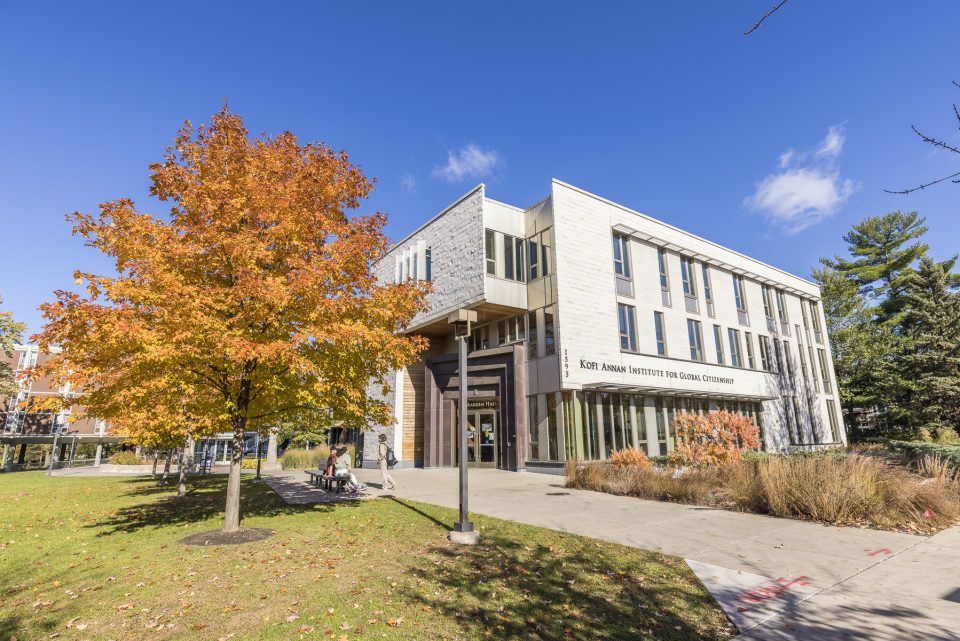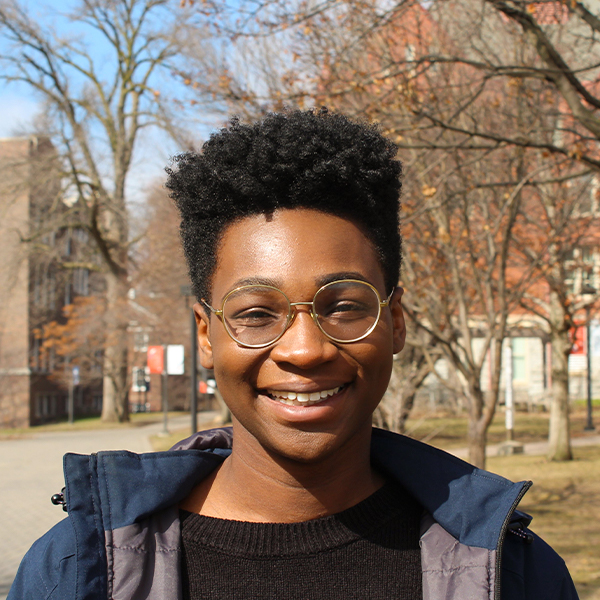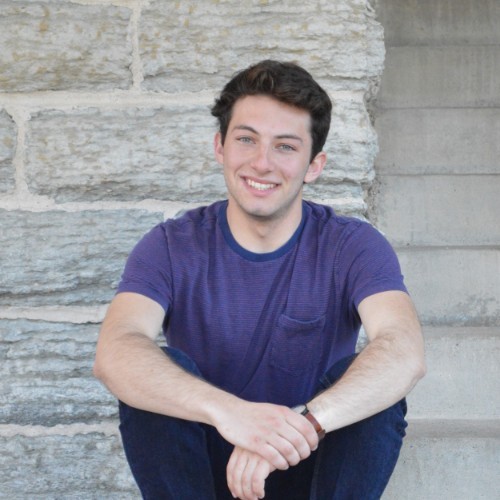
What is a Liberal Arts College?
We often think of the humanities and arts when we think of a liberal arts college. Many don’t realize that students also study biology, chemistry, and other sciences at a liberal arts college. (We offer 39 majors.) Hear first hand what that means for our students.


Traci Badu
Senior
(she, her, hers)
Houston, Texas by way of Kumasi, Ghana
Major – Neuroscience
Minors – Psychology and English
One more thing to know – QuestBridge Scholar
What is learning like at a liberal arts college?
When I visited Macalester and up until the end of my first year, I never truly understood what liberal arts meant. At the time that I decided on Macalester, I appreciated how students I met so easily blended their pursuits. One student I remember keenly was a Biology major, but took the time to volunteer at a neighboring school as a mentor and tutor. I expected that she would talk about her journey at Macalester through the lens of her Biology major and Pre-Med focus. She surprised me by talking about how her Biology major was a nice backdrop to her work as a mentor and tutor because it was in classes that she learned the impact of stress on health and in the school where she saw how that manifested in youth.
At this point, I still didn’t reconcile this as one of the many beauties of a liberal arts education; rather I thought it was her disposition. I later learned that blending different subjects, engaging with community, and openness to learning from communities were large parts of many other students’ experience because that is the central goal of a liberal arts education. It is difficult to find a professor that will isolate their academic subject from other subjects and even harder to find one that will encourage you to think in that manner. The liberal arts structures learning as narratives. It is the difference between memorizing the names of different neurons and learning the structures and characteristics of neurons and how activity patterns in different parts of the brain require differently structured neurons. To me, learning how to learn, and then applying and challenging my understandings, is liberal arts.
Find out more
At Macalester, we combine a close-knit, welcoming community with the benefits of being in the Minneapolis/St. Paul metro area. Macalester students come from every state and 95 countries for an academic program ranked among the top in the nation where ideas and intellectual curiosity matter.


Sy Schimberg
Junior
(he, him his)
Sarasota, Fla.
Major – Philosophy
One more thing to know – Works at The Mac Weekly
Why did you choose liberal arts?
It came down to being treated like an adult, while cared for like a student. I think the adult part occurs at any college. It’s inherently connected to living without parents and paying for groceries and deciding when to go to bed and how often to clean your room and do your laundry.
But at liberal arts colleges there is an intense focus on the power of being a student. Maybe a better word than power is potential. Professors are committed to unlocking the potential of students and helping us grow as much as we can inside a classroom for four years.
I should add the “outside of the classroom” piece to that equation too. Macalester has an awesome alum network of people who I should add the “outside of the classroom” piece to that equation, too. Macalester has an awesome network of alumni—people who are extremely successful in so many fields. Just the other day I was interviewing with a speechwriter who mentioned to me that the co-president of West Wing Writers (the largest speech writing consulting company in the country) is a Mac alum. The head writer for Stephen Colbert is a FREAKING MACALESTER ALUM! Staff at Macalester got me in touch with her, and she wrote me an email with like 10 paragraphs of advice! It was incredible.
The majority of your life as an adult out of college is going to be independent and often difficult and rarely will there be people who are willing to guide you on a path to success. So to be in an environment for four years where you get both the adult thing and the guidance is extremely unique and I believe incredibly beneficial.


Erin Isomura
Senior
(she, her, hers)
Tokyo, Japan
Major – Media & Cultural Studies
Minor – Music
One more thing to know – Studied away in Amsterdam
What attracted you to a liberal arts college?
I chose a liberal arts college first because liberal arts colleges are generally smaller than their university counterparts. When thinking about what type of school I wanted to go to and then subsequently the type of education that I wanted, being able to build a tight-knit community and also be in small, more individualized classrooms was really important to me. Most small colleges happen to be liberal arts, so that narrowed my choice down.
I was also looking for a range of experiences and a college that would allow me to really explore what my options were, and what I might be interested in. I took great advantage of this, taking classes that cross listed around 10 different departments my freshman year. I was able to complete a lot of my General Education credits and move forward in my college education without having to make a premature and un-thought through choice about what I was going to focus on in College.
It also meant a lot to me that everybody would be expected to take gen ed credits, no matter what their course load or major was — I really liked the idea that everybody at the college would be trying out different and new things. At college, this has meant that I’ve learned a lot from so many people about so many different topics because everyone is taking something a little bit out of their comfort zone at one point or another. Whether that be the Philosophy of Gender and Race or Music Theory – everyone’s taking something new and interesting.
Is a liberal arts education a good fit for you?
- Do you want to explore several areas of interest? Do you consider yourself a curious person? A liberal arts college focuses on academic disciplines over career-based majors, with classes often set in a dialogue or conversational format versus a lecture format. Students take courses spanning across the social sciences, mathematics, natural sciences, humanities, and arts as part of their degree and chosen area of study. This creates a broad base as the foundation for their degree.
- Does connecting areas of study, community service, and personal interests seem attractive to you? Students at a liberal arts college take a range of courses before graduating – there is a fundamental belief that subjects and courses intersect in multiple ways.
- Are you thinking about the physical location of where you’ll go to college? Liberal arts colleges are often found in the Northeast region of the U.S., but nearly 3/4 of all states have one or more liberal arts colleges (including our state of Minnesota). They are found in a variety of rural, suburban, and urban settings. Macalester happens to be in the heart of the Twin Cities, a metro area populated by 3.5 million people. However, some liberal arts college are in towns with populations similar to the college itself.
- Do you prefer a small college with easy access to other students and faculty, or do you prefer the size and anonymity of a large school? The student body size at a liberal arts college is between 1,800 and 4,000 students.
- Would you prefer smaller or larger class sizes? Class sizes at a liberal arts college are on average 8-20 students, allowing for more 1:1 advising with faculty.
- When you think about making connections and building community, what interests you most? Communities at liberal arts colleges are considered more tight-knit and are often mission driven, articulating their values as part of the campus culture. Students often find connections by participating in student organizations, academic associations, and on-campus activities. Greek life isn’t typically part of student life at liberal arts colleges, as it may be at many large universities.
- Are you looking for an undergraduate or graduate degree? Liberal arts colleges primarily focus on undergraduate learning, with a few exceptions. Of course you can absolutely pursue a graduate degree if you are an undergraduate at a liberal arts college. But you might need to receive that graduate degree at an institution other than your undergraduate liberal arts college. This is a relatively common occurrence and shouldn’t be a deterrent to choosing your favorite liberal arts college.
- Are you wanting to continue your involvement in music and the fine arts? Liberal arts colleges provide an excellent opportunity to remain involved in music and the fine arts. Students participate in ensembles and course work within the performing and visual arts without declaring a major in that area of study. Students have the ability to be biochemistry majors who sing in the choir and sculpt during their free time.
- Are you focused on a sport or an athletic division? The athletics culture is often unique to each liberal arts college, so it’s worthwhile to research any sports you’re interested in and connect with coaches directly if you’re thinking about life as a student athlete.